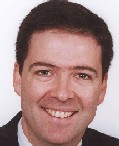Deputy AG Comey Testifies Before House
Judiciary Committee on PATRIOT Act
June 8, 2005. The House Judiciary Committee (HJC) held a hearing titled "Reauthorization of the USA PATRIOT Act". This was another in a long series of hearings held by the HJC, or its Crime Subcommittee.
 The only witness was James Comey (at right), the
Deputy Attorney General. See,
prepared
testimony [PDF]. He asked that the Congress permanently extend the provisions of the
USA PATRIOT Act that are scheduled to expire at the end of this year. He opposed
proposals to include any further sunsetting provisions. He asserted that the Congress
can conduct effective oversight without the presence of sunsetting provisions.
The only witness was James Comey (at right), the
Deputy Attorney General. See,
prepared
testimony [PDF]. He asked that the Congress permanently extend the provisions of the
USA PATRIOT Act that are scheduled to expire at the end of this year. He opposed
proposals to include any further sunsetting provisions. He asserted that the Congress
can conduct effective oversight without the presence of sunsetting provisions.
Many members of the Committee advocated the inclusion of further sunsetting provisions, arguing that it is only the presence of those clauses that incents the Department of Justice (DOJ) to cooperate with the HJC in its oversight activities.
Rep. James Sensenbrenner (R-WI), the Chairman of the HJC, presided. He said that the DOJ has been more forthcoming in the past year and one half than it was in previously years. He commended Comey and Attorney General Alberto Gonzales for this, and stated, "I hope that that continues".
While the DOJ's cooperation and relations with the HJC have improved recently, the DOJ remains secretive on a number of PATRIOT Act issues. For example, Comey's written testimony regarding the various pen register and trap and trace device (PR&TTD) provisions was vague on what information is available to the DOJ under a PR&TTD order in the context of e-mail and use of the internet. Previous DOJ witnesses have also been vague.
See also, story titled "House Crime Subcommittee Holds Hearing on Pen Register and Trap and Trace Device Authority" in TLJ Daily E-Mail Alert No. 1,125, April 29, 2005.
As another example, Comey said nothing about DOJ access to the content of VOIP communications. At the April 21 hearing on this subject, a DOJ witness ducked questions. On April 21, Rep. William Delahunt (D-MA) asked questions, and asked that the DOJ to respond to written questions. Rep. Delahunt told TLJ after the hearing on June 8 that he has yet to receive responses.
See also, story titled "House Crime Subcommittee Holds Hearing on § 209 of PATRIOT Act, Stored Communications and VOIP" in TLJ Daily E-Mail Alert No. 1,125, April 29, 2005.
Much of the questions and discussion at the June 8 hearing focused on the non-technology related sections of the PATRIOT Act. Representatives asked about immigration, immigration related procedures, and library records.
Comey's testimony and responses differed from those of many DOJ witnesses before him, to the extend that he was more open and self-deprecating. For example, in prior hearings DOJ witnesses have forcefully argued, in response to questions about limiting DOJ authority, or increasing safeguards against DOJ abuse of authority, that DOJ personnel are highly dedicated professionals whose work in fighting crime and terrorism would be hampered by such changes. In rebuttal, Representatives and Senators have raised the FBI's wiretapping of civil rights leaders, the FBI's transfer of hundreds of FBI files of leading Republicans to the Clinton White House, and Ruby Ridge.
Comey, in contrast, said that the DOJ personnel need oversight, and the knowledge that they are being watched. He said that "we need a check on our power", and that there is a potential for abuse. He added, "we have a history of it happening."
Nevertheless, like other DOJ witnesses, he argued against creating any new sunset provisions. He also rejected all of the legislative proposals advanced by Committee members at the hearing.
The HJC's Crime Subcommittee has held a long and detailed series of hearings. This was the first full Committee hearing on the PATRIOT Act in two months. It provided insight into the thoughts of members of the full Committee who are not also member of the Crime Subcommittee. This is significant because most of the members of the full Committee who tend to focus on technology related issues, and promote technology, are not members of the Crime Subcommittee.
Rep. Bob Goodlatte (R-VA) participated in the June 8 hearing. He used his time to defend the PATRIOT Act, including § 217, titled "Interception of Computer Trespasser Information". Peter Swire, a law professor at Ohio State University, testified in April that the PATRIOT Act created a serious potential for abuse of the legitimate expectations of privacy of the law abiding customers of ISPs. See also, story titled "House Crime Subcommittee Holds Hearing on § 217 of PATRIOT Act" in TLJ Daily E-Mail Alert No. 1,125, April 29, 2005.
Similarly, Rep. Chris Cannon
(R-UT), another technophile, attended the hearing, but said nothing about any of
the technology related provisions of the PATRIOT Act.